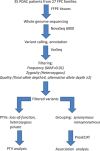Whole genome sequencing identifies rare genetic variants in familial pancreatic cancer patients
- PMID: 35312039
- PMCID: PMC9313800
- DOI: 10.1111/ahg.12464
Whole genome sequencing identifies rare genetic variants in familial pancreatic cancer patients
Abstract
Pancreatic ductal adenocarcinoma (PDAC) represents one of the most lethal malignancies with very high mortality and short survival time. About 5-10% of the PDAC patients have a familial predisposition to the disease designated as familial pancreatic cancer (FPC), suggesting genetic modulation of FPC pathogenesis. It is estimated that currently identified sequence variants account for less than 20% of the genetic basis of FPC leaving the majority of the genetic architecture unclarified. We performed whole genome sequencing (WGS) analysis on benign formalin-fixed paraffin-embedded (FFPE) tissues from 35 FPC patients focusing on genes enriched by rare and functional sequence variants. We identified 40 genes hosting at least 2 protein truncating variants (PTVs). Significant overlaps of the 40 genes were found (p < 1 × 10-22 ) with cancer genes, cancer driver genes and genes found in previous studies on cancer, including ATM, POLE, BRCA2, TYR03, PABPC1 and SSC5D. The PTV genes are significantly overrepresented in biological pathways in cancer development and progression including extracellular matrix organization, signaling by RHO GTPases and RHO GTPase cycle. Association analysis using external controls detected 6 genes with p < 0.05. The WGS analysis revealed high heterogeneity in the detected rare variants among FPC patients and provides novel genes harboring potential mutational hotspots for future validation and replication.
Keywords: familial pancreatic cancers; pancreatic ductal adenocarcinoma; protein truncating variants; rare variants; whole genome sequencing.
Conflict of interest statement
The authors declare no conflicts of interest.
Figures
Similar articles
-
Whole genome sequencing identifies rare germline variants enriched in cancer related genes in first degree relatives of familial pancreatic cancer patients.Clin Genet. 2021 Nov;100(5):551-562. doi: 10.1111/cge.14038. Epub 2021 Aug 3. Clin Genet. 2021. PMID: 34313325 Free PMC article.
-
Germline genetic variability in pancreatic cancer risk and prognosis.Semin Cancer Biol. 2022 Feb;79:105-131. doi: 10.1016/j.semcancer.2020.08.003. Epub 2020 Aug 18. Semin Cancer Biol. 2022. PMID: 32818625 Review.
-
Mutation analysis of the PALB2 gene in unselected pancreatic cancer patients in the Czech Republic.Cancer Genet. 2016 May;209(5):199-204. doi: 10.1016/j.cancergen.2016.03.003. Epub 2016 Apr 5. Cancer Genet. 2016. PMID: 27106063
-
Genetics of Familial and Sporadic Pancreatic Cancer.Gastroenterology. 2019 May;156(7):2041-2055. doi: 10.1053/j.gastro.2018.12.039. Epub 2019 Jan 18. Gastroenterology. 2019. PMID: 30660730 Review.
-
Genomic analysis of familial pancreatic cancers and intraductal papillary mucinous neoplasms: A cross-sectional study.Cancer Sci. 2022 May;113(5):1821-1829. doi: 10.1111/cas.15316. Epub 2022 Mar 9. Cancer Sci. 2022. PMID: 35238112 Free PMC article.
References
-
- Al‐Sukhni, W. , Joe, S. , Lionel, A. C. , Zwingerman, N. , Zogopoulos, G. , Marshall, C. R. , Borgida, A. , Holter, S. , Gropper, A. , Moore, S. , Bondy, M. , Klein, A. P. , Petersen, G. M. , Rabe, K. G. , Schwartz, A. G. , Syngal, S. , Scherer, S. W. , & Gallinger, S . (2012). Identification of germline genomic copy number variation in familial pancreatic cancer. Human Genetics, 131(9), 1481–1494. - PMC - PubMed
-
- Bellido, F. , Pineda, M. , Aiza, G. , Valdés‐Mas, R. , Navarro, M. , Puente, D. A. , Pons, T. , González, S. , Iglesias, S. , Darder, E. , Piñol, V. , Soto, J. L. , Valencia, A. , Blanco, I. , Urioste, M. , Brunet, J. , Lázaro, C. , Capellá, G. , Puente, X. S. , & Valle, L . (2016). POLE and POLD1 mutations in 529 kindred with familial colorectal cancer and/or polyposis: review of reported cases and recommendations for genetic testing and surveillance. Genetics in Medicine, 18(4), 325–332. - PMC - PubMed
-
- Benjamini, Y. , & Hochberg, Y . (1995). Controlling the false discovery rate: A practical and powerful approach to multiple testing. Journal of the Royal Statistical Society: Series B (Methodological), 57(1), 289–300.
-
- Chaffee, K. G. , Oberg, A. L. , McWilliams, R. R. , Majithia, N. , Allen, B. A. , Kidd, J. , Singh, N. , Hartman, A. R. , Wenstrup, R. J. , & Petersen, G. M. (2018). Prevalence of germ‐line mutations in cancer genes among pancreatic cancer patients with a positive family history. Genetics in Medicine, 20(1), 119–127. - PMC - PubMed
Publication types
MeSH terms
Supplementary concepts
LinkOut - more resources
Full Text Sources
Medical


